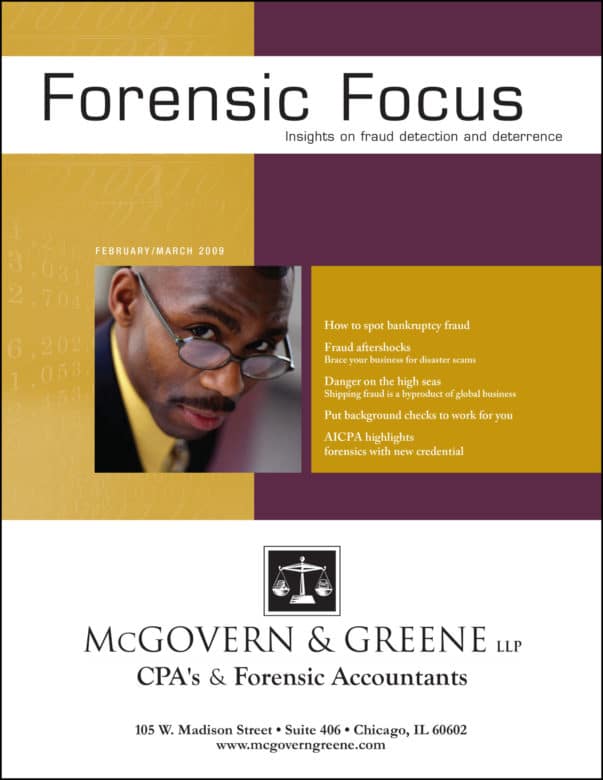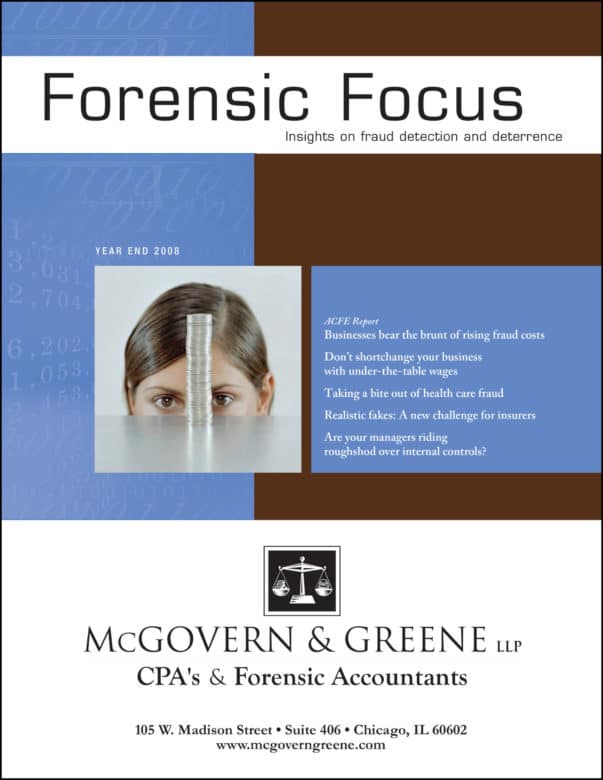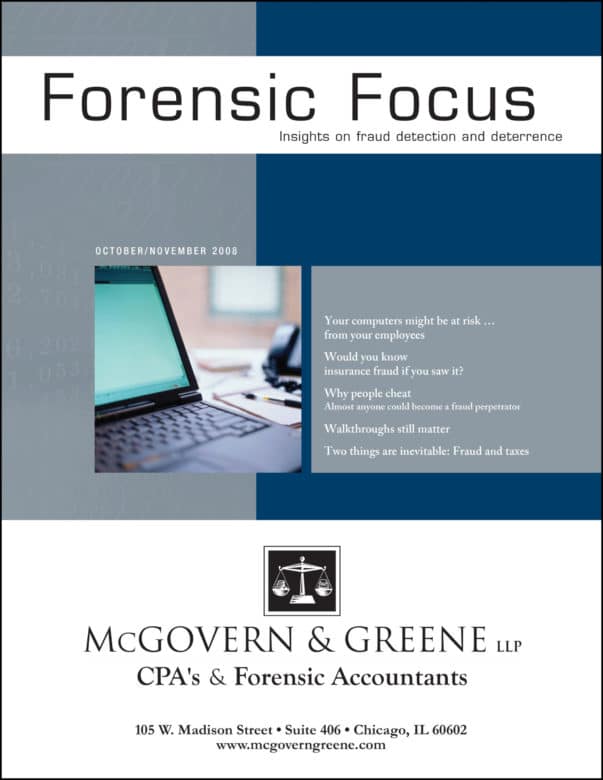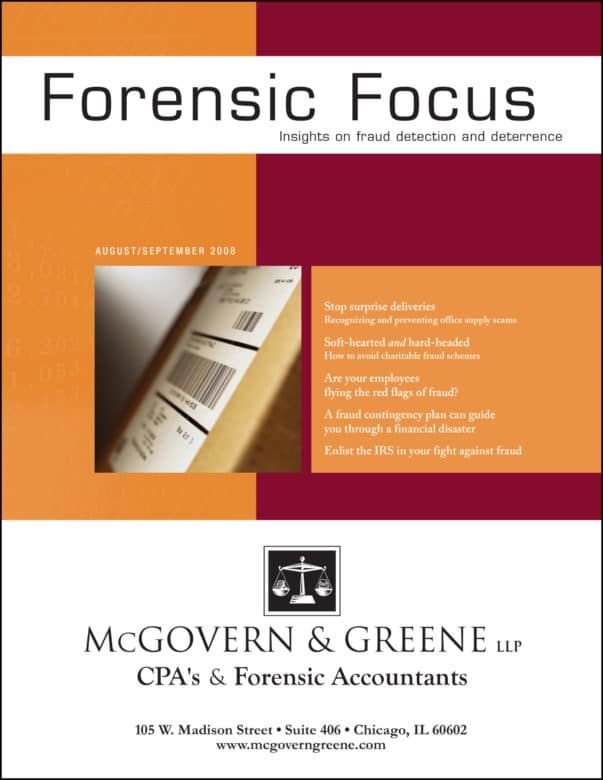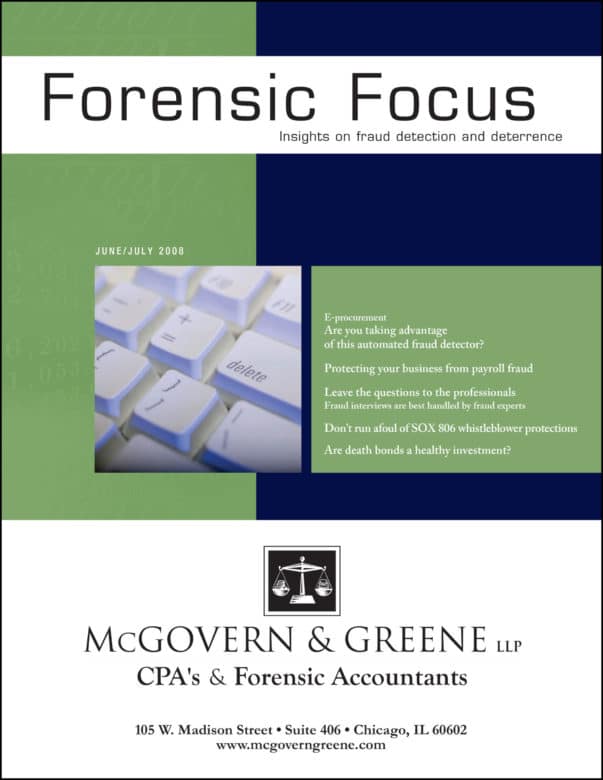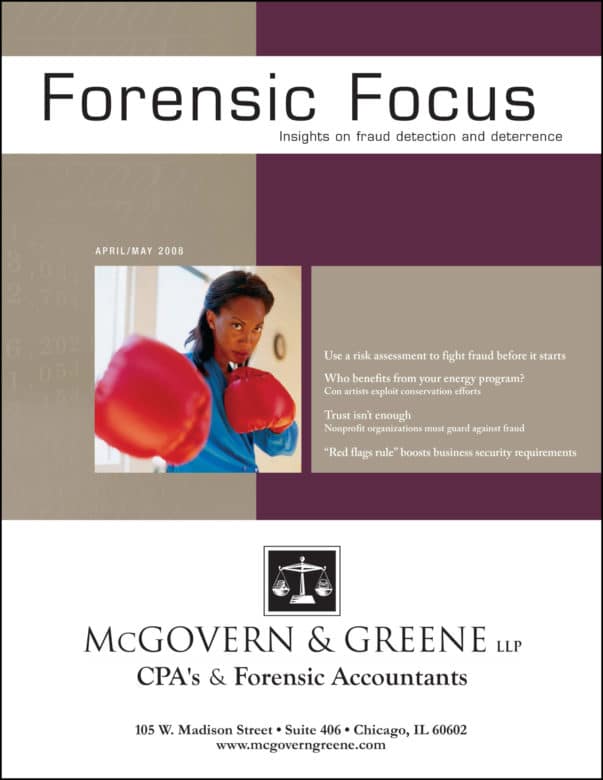Forensic Focus Articles

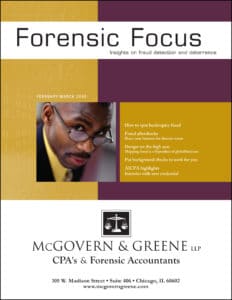 FEB/MAR 2009 Issue of Forensic Focus
FEB/MAR 2009 Issue of Forensic Focus
How to spot bankruptcy fraud
As bankruptcies loom larger on the economic horizon, business owners must look closely before extending credit. This article discusses common bankruptcy fraud schemes, such as bust-outs and concealing assets, either by hiding them before filing for bankruptcy or selling assets at below-market rates to a straw buyer after filing. Business owners are encouraged to consult their financial and legal advisors when they suspect this type of fraud.
Fraud aftershocks
Brace your business for disaster scams
Few things in life are certain, but when disaster strikes, the number of fraud incidents can be relied on to skyrocket. In the wake of a hurricane, tornado, flood, fire or earthquake, fraudulent operators are quick to surface, but, as this article explains, they often carry warning signs. Disaster fraud schemes discussed include construction con jobs, vehicle repair fraud, fake relief workers and charity schemes.
Danger on the high seas
Shipping fraud is a byproduct of global business
Many businesses are thriving thanks to increased participation in overseas markets. Unfortunately, global business is also a boon for shipping fraud perpetrators. This article outlines various shipping fraud schemes and encourages businesses to thoroughly vet their shipping companies as well as their overseas business partners.
Put background checks to work for you
Learning how to properly conduct reference and background checks can provide additional muscle to any company’s antifraud program. This article talks about the importance of following privacy and antidiscrimination laws, including obtaining the candidate’s authorization. It also advises on how to handle reference checks sensitively.
AICPA highlights forensics with new credential
This short article reports on a new forensic accounting credential — Certified in Financial Forensics — offered by the Association of International Certified Professional Accountants. Among other things, it explains the experience and education required to receive the credential.
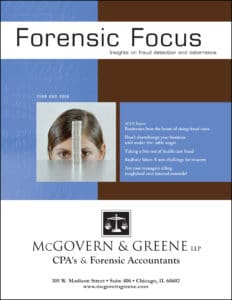 2008 Year-End Issue of Forensic Focus
2008 Year-End Issue of Forensic Focus
ACFE report
Businesses bear the brunt of rising fraud costs
This article summarizes the results of the latest biennial Association of Certified Fraud Examiners’ Report to the Nation on Occupational Fraud & Abuse. For example, the cost of fraud is going up, and small businesses continue to shoulder a disproportionate share of the load. And some industries are harder hit than others, including health care, manufacturing and government. Another notable finding: While fraud losses have decreased for public companies, the median fraud loss for private businesses is rising.
Don’t shortchange your business with under-the-table wages
Business owners are always looking for ways to improve their financial position, and some may be tempted to pay workers in cash. But it’s important to resist the temptation. Not only do owners and their employees risk IRS penalties and audit time, but paying under-the-table wages can lead to a prison sentence.
Taking a bite out of health care fraud
For every dollar the federal government spent investigating whistleblower-reported health care fraud in 2007, it recovered $15, according to Taxpayers Against Fraud. As this article discusses, the Health Insurance Portability and Accountability Act of 1996 (HIPAA) can take much of the credit for this success. Additional law enforcement funding has enabled authorities to pursue and take action against, among others, health care providers, drug companies and medical suppliers.
Are your managers riding roughshod over internal controls?
Anyone is capable of committing fraud — even trusted managers. So although businesses want to give their managers some flexibility to override financial reporting controls when it’s necessary, overrides should be rare occurrences. And companies need to require the manager to obtain subsequent approval from the company’s owner or another authorized employee.
Realistic fakes: A new challenge for insurers
This article talks about the latest fraud scam: authentic-looking store receipts that individuals can buy on the Web to support false insurance claims. Fortunately, insurers are getting better at spotting fake receipts, and legal authorities are only too happy to prosecute those who use them.
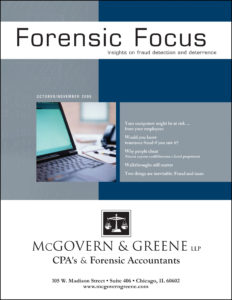 OCT/NOV 2008 Issue of Forensic Focus
OCT/NOV 2008 Issue of Forensic Focus
Your computers may be at risk … from your employees
Motivated by the potential for big rewards, occupational thieves have come up with a variety of billing fraud schemes. But businesses and their legal advisors can help prevent large losses and possibly enhance their chances of a successful prosecution if they understand how fraud experts uncover them. This article describes how pass-through, personal purchase, pay-and-return and shell company schemes work, and how to spot them.
Would you know insurance fraud if you saw it?
Insurance fraud has a timeless appeal among scam artists, but it becomes even more popular when economic times are hard. Slip ‘n falls, fake car accidents and even arson are greater threats as people feel a pinch in their pocketbooks, making now a good time for businesses to redouble their protection and recognition efforts. This article provides prevention tips, such as installing a security camera system and training employees to recognize suspicious accidents and report them.
Why people cheat
Almost anyone could become a fraud perpetrator
In many cases, employees who commit fraud are the most likable people in the office — personable, helpful and good at their jobs, as well as seemingly trustworthy. But, as this article explains, fraud doesn’t begin with dishonesty; it begins with pressure. Owners can learn to spot potential fraudsters, though. Upper-level thieves are likely to be unreasonably sensitive to criticism or scrutiny and to surround themselves with sycophants. Rank-and-file cheats often feel they’ve been treated unfairly and steal to seek retribution.
Walkthroughs still matter
This short article discusses Auditing Standard No. 5 (AS5), which states that public companies are no longer required to hire auditors to conduct walkthroughs. It encourages both public and private companies, however, to continue conducting expert walkthroughs as the best defense against fraud.
Two things are inevitable: Fraud and taxes
In a new fraud scheme targeting businesses, someone posing as an IRS employee phones targets and tells them that they’re eligible for tax refunds as rewards for filing their taxes early. Then, the scam artist tells the potential victim that he or she must provide bank account information for the “deposit.” This article lists tips on spotting such IRS fakes.
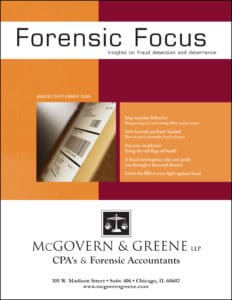 AUG/SEP 2008 Issue of Forensic Focus
AUG/SEP 2008 Issue of Forensic Focus
Stop surprise deliveries
Recognizing and preventing office supply scams
Office supply scams aren’t new, but they’re enduring, costing American businesses as much as $200 million a year. This article talks about why this type of fraud has such staying power, how owners can recognize its signs — suspicious telemarketing calls, unfamiliar vendor names and offers of free gifts — and nip it in the bud before it gets a chance to cause widespread financial damage. Businesses are encouraged to know their vendors well so they don’t inadvertently pay fraudsters’ invoices.
Soft-hearted and hard-headed
How to avoid charitable fraud schemes
Businesses are frequently asked to donate money or goods to charity. Nine times out of 10 such requests are legitimate and the only problem is deciding how to allocate the company’s charitable dollars. Unfortunately some solicitors aren’t legitimate and are willing to appeal to a business owner’s generosity. This article provides tips on spotting solicitors who use an advertising-sales scam.
Are your employees flying the red flags of fraud?
Forensic accountants are the best people to unearth the “hows and whys” of occupational theft, but it’s up to business owners to know when it’s time to call in professional help. This article lists common signs that something is amiss, including duplicate payments, transaction amounts that are either too small or too large and dramatic changes in an employee’s lifestyle.
A fraud contingency plan can guide you through a financial disaster
Even if they don’t believe their employees are capable of fraud, businesses must be prepared for it. That’s why every company needs a fraud contingency plan that lists fraud risks, assigns responsibilities should fraud occur, determines an investigation’s objectives and spells out possible punishments for the perpetrator. This article encourages companies to frequently update their plan.Enlist the IRS in your fight against fraud This short article alerts businesses to an unlikely ally against fraud: the IRS. Because occupational thieves are unlikely to pay tax on their ill-gained income, the IRS may be able to prosecute them for tax evasion, even when the company is unable to assemble enough evidence for a fraud case
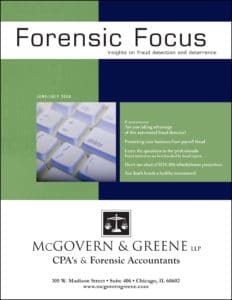 JUN/JUL Issue of Forensic Focus
JUN/JUL Issue of Forensic Focus
E-procurement
Are you taking advantage of this automated fraud detector?
Businesses that aren’t using their e-procurement systems to prevent and detect fraud probably aren’t getting their money’s worth. Automated procurement systems can be just as efficient at spotting red flags for fraud as they are at moving orders along. This article describes the types of screens e-procurement systems can perform and encourages businesses to combine screens with employee profiling to identify staff members most likely to commit criminal acts.
Protecting your business from payroll fraud
Thieves no longer need to get their hands on a check to commit payroll fraud; today’s fraudsters need only a computer. And unfortunately, businesses may be held responsible if thieves succeed at scamming their financial institution. This article talks about ways companies can fight payroll fraud by, for example, encouraging employees to sign up for direct deposit and limiting the number of authorized check signers.
Leave the questions to the professionals
Fraud interviews are best handled by fraud experts
When they suspect an employee of fraud, owners and managers may be tempted to bring that individual in for a good grilling. It’s better, however, to leave interrogations to the experts. Fraud specialists are more likely to be objective, and they know how to make the most of what may be their one opportunity to question a perpetrator. This article discusses the methods experts use to elicit information and how they can help a company build a case against a perpetrator.
Don’t run afoul of SOX 806 whistleblower protections
Sarbanes-Oxley Act (SOX) provisions apply primarily to public companies. But private business owners should be familiar with the SOX 806 rules regarding whistleblower protection because companies that act as agents or subcontractors of public companies have been held to SOX standards. This article explains the provisions of SOX 806, including its prohibitions and the standard of proof required of employees and accused companies.
Are death bonds a healthy investment?
This short article discusses how shady operators are using life settlement-backed securities, or death bonds, to bilk investors.
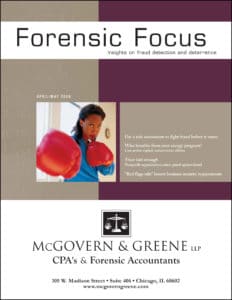 APR/MAY 2008 Issue of Forensic Focus
APR/MAY 2008 Issue of Forensic Focus
Use a risk assessment to fight fraud before it starts
Under the Sarbanes-Oxley Act (SOX), publicly traded companies must conduct fraud risk assessments, though SOX and federal regulators have offered little guidance on how to do that. Privately held businesses are under no such legal obligation. But it’s in their best interests to assess their fraud vulnerability with the assistance of a forensic accountant. In fact, a thorough risk assessment, which includes a close examination of internal controls, management and employee interviews, and goal prioritization, should be the core of every company’s antifraud program. Who benefits from your energy program?
Con artists exploit conservation efforts
High oil prices and legislation to reduce greenhouse gas emissions and conserve energy are forcing many businesses to become more eco-conscious. This heightened awareness ultimately may benefit the environment — but it’s definitely proving profitable for opportunistic con artists perpetrating energy investment scams. As this article explains, companies also need to look out for brokers selling worthless carbon credits and services that claim to eliminate greenhouse gases in manufacturing plants.
Trust isn’t enough
Nonprofit organizations must guard against fraud
Because their cultures are oriented toward helping others, nonprofits often find it impossible to imagine that anyone working for them would steal. The reality is that people who defraud nonprofit organizations typically are liked and trusted employees and volunteers who otherwise appear committed to the cause. This can make rooting them out difficult. This article lists several fraud schemes common to nonprofits and provides prevention tips, including limiting access to sensitive information and comparing cash receipts to the amount of event tickets sold.
“Red flags rule” boosts business security requirements
The short article summarizes the new federal “red flags rule” intended to curb fraud. By Nov. 1, 2008, all financial institutions and creditors — including many auto dealers and retailers — must have programs in place that enable them to detect and prevent identity theft and to identify certain patterns and practices that suggest fraud.
This publication is distributed with the understanding that the author, publisher and distributor are not rendering legal, accounting or other professional advice or opinions on specific facts or matters, and, accordingly, assume no liability whatsoever in connection with its use.
GFAS Forensic Focus Archives
Expert Forensic Accounting Services
Chicago | Las Vegas
FORENSIC ACCOUNTING
SERVICES
Insurance Claims
Accounting Investigations
Mergers & Acquisitions
Due Diligence Reviews
Dispute Advisory Services
Special Examinations
Contract Audits and Recoveries
LITIGATION SERVICES
Expert Witness Testimony
Commercial Damages
Shareholder/Partner Disputes
Bankruptcy and Insolvency
CPA Malpractice Claims
Contract Disputes
Estate and Trust Disputes
Data Mining & Electronic Discovery
FRAUD EXAMINATIONS

